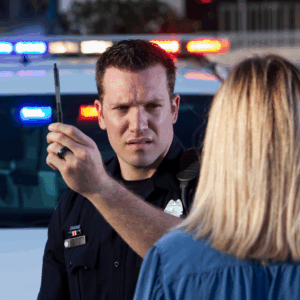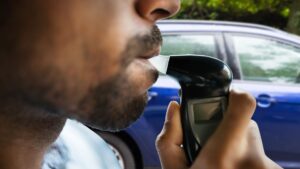 How to Beat a DWI Charge in New York
How to Beat a DWI Charge in New York
The night started like any other, a simple outing with friends, a few drinks, and the familiar feeling of the New York State Thruway beneath your tires. Suddenly, there are police lights in your rear view mirror, and before you know it, an officer suspects you of DWI.
As he conducts his investigation, you see that the digital display of the breathalyzer shows a reading that seems impossibly high. Yet, the officer’s face confirms the serious nature of the reading. This isn’t just a typical DWI—it’s something more serious. Before you’ve begun to process what’s happening, you discover you’re facing the life-altering consequences of an aggravated DWI charge.
Understanding the difference between a standard DWI and an aggravated one can help you see what is at stake and why you need experienced legal help to protect your future.
What Is Aggravated DWI in New York?
Under New York law, an aggravated DWI charge applies in two specific scenarios.
High BAC
If a driver is operating a vehicle with a Blood Alcohol Concentration (BAC) of .18% or higher, the charge can increase to an aggravated DWI. Keep in mind that a BAC of .18% or higher means you have more than twice the legal limit of alcohol in your system while driving. This is a “per se” offense, meaning the high BAC alone is sufficient for the charge, regardless of the presence or absence of other signs of intoxication.
Child Passenger
If a driver operates a vehicle while intoxicated or impaired by drugs with a child 15 years old or younger as a passenger, the State will likely charge them with aggravated DWI. This is an enhancement under Leandra’s Law, named for a child who died in a drunk driving accident. The charge is automatically an E felony, a much more serious offense with long-term consequences.
An aggravated DWI conviction carries significantly harsher punishments than a standard DWI because it signals a higher level of recklessness in the eyes of the law.
Penalties for Aggravated DWI
The consequences of an aggravated DWI conviction vary depending on whether it is your first offense or if you have prior DWI convictions. For a first-time high BAC DWI penalties, you could be looking at:
- A fine between $1,000 and $2,500;
- Up to one year in jail;
- Revocation of your driver’s license for at least one year; and
- Installation of an ignition interlock device (IID) on any vehicle you own or operate, at your expense, for a minimum of 12 months.
The penalties increase substantially for repeat offenders. A second aggravated DWI offense within 10 years becomes an E felony that carries a fine of up to $5,000, up to four years in prison, and an 18-month license revocation.
A third offense within 10 years is a D felony, with a fine of up to $10,000, up to seven years in prison, and an 18-month license revocation. These are the baseline consequences. An aggravated DWI can also have long-term effects on your job prospects, insurance rates, immigration status, and leave you with a permanent criminal record.
Aggravated DWI Defense Strategies
Defending against an aggravated DWI requires a different approach than defending against a standard DWI. The high BAC readings create additional challenges and open up specific defense opportunities, such as:
- Challenging BAC Test Accuracy. High BAC readings make accuracy challenges crucial because minor errors can mean the difference between a standard and an aggravated DWI.
- Machine calibration issues. Operators must properly calibrate and maintain breathalyzer machines to help ensure reliable readings. Your lawyer can ask about the qualifications of the testing officer and whether they properly maintained and calibrated the machine prior to administering your test.
- Medical conditions. Certain medical conditions, like diabetes or acid reflux, can affect BAC readings or create false positives. These conditions become more significant when BAC levels are near the aggravated threshold.
- Rising blood alcohol. Your BAC continues rising for up to 90 minutes after your last drink. This defense argues that your BAC was below .18% while driving, but rose above that level by the time the police administered the test.
- Constitutional challenges. High BAC cases often involve more intensive police investigations that might have involved constitutional violations. For example, if the traffic stop was illegal, your lawyer can weaken the prosecution’s case by challenging that action and getting resultant evidence suppressed.
Every detail matters when you are facing an aggravated DWI charge. The distinction between a misdemeanor and a felony can come down to a single piece of evidence—so having seasoned representation becomes critical.
Protect Your Driving Privileges with Greenspan & Greenspan
Greenspan & Greenspan, P.C. have been a cornerstone of legal defense in New York for decades. Since 1959, our legal team has been widely recognized for its dedicated and unwavering legal representation. Our reputation as a formidable courtroom presence has been earned over the course of many years, handling countless DWI and traffic ticket cases. We have built a legacy of safeguarding the rights and futures of our clients through diligent preparation, courtroom excellence, and a history of successful case outcomes.
We’ve helped Rockland County clients protect their rights and move forward after life-altering charges. Take a proactive step toward a more positive outcome by contacting our office today.
Frequently Asked Questions
Can an Aggravated DWI Be Reduced to a Regular DWI?
In some cases, yes. Prosecutors may agree to reduce the charge as part of a plea deal, especially if it is your first offense and your record is otherwise clean. However, reductions are never guaranteed and often require strong legal advocacy.
Will I Automatically Lose My License After an Aggravated DWI Arrest?
Not automatically, but you must act quickly to stop a suspension by requesting a hearing within 10 days of your arrest. If you do not, the DMV will suspend your license 30 days after your arrest. At arraignment, most judges issue a pre-conviction license suspension. You may request a hardship hearing, but the standard is strict, and relief is limited. Without an attorney guiding you, you risk being without driving privileges for months.
Does Aggravated DWI Affect Professional Licenses in New York?
Professions regulated by state licensing boards, such as teachers, nurses, and real estate brokers, may face disciplinary action after a conviction. Reporting requirements vary by profession, but the collateral consequences can be severe.
Resources
- Vehicle and Traffic Law § 1192. New York State Senate, link.
- Penalties for Alcohol or Drug-Related Violations. New York State DMV, link.
- Alcohol and Other Drugs – NY Driver’s Manual. New York State DMV, link.
- Vehicle and Traffic Law § 1194. New York State Senate, link.
- Vehicle and Traffic Law § 1197. New York State Senate, link.






